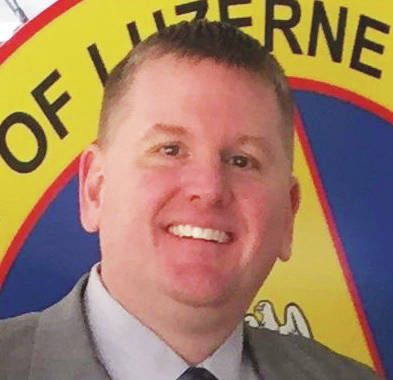Click here to subscribe today or Login.
An estimated $7 million to $8 million of Luzerne County’s proposed $20 million emergency radio system upgrade is for portable and mobile radio equipment that will be used by municipal police and emergency responders, county council members learned during a briefing on the project last week.
Councilman Stephen A. Urban asked why municipalities are relying on the county to purchase and fund the equipment and what, if anything, they are doing to help come up with money.
Facing the potential need for unpopular borrowing to fund the project, council members could reduce the county’s expense by forcing municipalities to acquire the radio equipment on their own.
County 911 Executive Director Fred Rosencrans told council the administration and project consultant believe county purchasing would be best to realize lower bulk purchasing prices and ensure uniform equipment is purchased, but municipalities would be expected to reimburse the county if they can obtain grants or other funding.
The switch from a 20-year-old analog system to a digital one is necessary, officials said, because equipment support for the radio transmitters and receivers that allow emergency responders to exchange messages will end Dec. 31, 2020.
The system won’t automatically shut down on that date, but replacement parts have become increasingly difficult to find because the county’s current system is no longer manufactured, Rosencrans has emphasized. He also questioned the wisdom of investing money to keep the current system operational when the need to convert to digital will be unavoidable at some point, noting few citizens still have analog televisions at home.
Councilman Harry Haas said municipalities should band together to seek casino gambling funding — known as the Local Share Account, or LSA, program — to cover at least some of the cost of the local radio equipment. He asked the administration to take a leadership role in discussing that possibility with municipalities.
County Manager C. David Pedri said he agrees with Haas, but he questioned if municipalities would be willing to seek gambling funding for radio equipment.
“Don’t forget. Every municipality in Luzerne County has their own wish list that they’re going to ask for for LSA money. So we’d be asking the municipalities to forego this road or this project that’s near and dear to them in order to do this,” Pedri said.
Municipalities may be more amenable if county officials decide they won’t fund the local portion without local cooperation, Pedri said.
“This is also something we can talk about. I’m open to any suggestion,” Pedri said.
Borrowing $20 million for the project would increase the county’s debt by an estimated $28.14 million, bringing the total owed from $291.76 to $319.9 million, the county’s financial advisor said. That projection factors in savings from debt refinancing.
Despite an extensive submission, the county administration was unsuccessful this year obtaining a $5 million state grant for the radio project that would have required a $5 million county match, Rosencrans told council. The county also was “hit with roadblocks” seeking another $150,000 grant, he said.
“It seems like every grant opportunity that we have, it closes in our face,” he said. “We are trying our best to get any type of funding we can from the beginning.”
Rosencrans said he also is researching the possibility of merging the county radio system with the state’s, which may provide some offsetting state funding and savings. This option would require the county to share its radio frequencies and 16 tower sites with the state and use a Motorola system already selected by the state, he said.
For now, the administration plans to publicly post a request for proposals by Oct. 1 from companies interested in furnishing the new system, he said.
The responses will provide firm costs for the project and would take months to process and screen, Rosencrans said.
“If we were to start tomorrow, we’re looking at two years to get the system in, get everybody programmed, get everybody used to it and trained,” he said. “The clock is ticking.”






